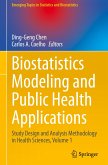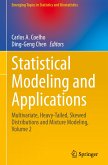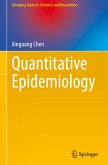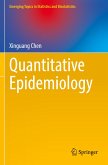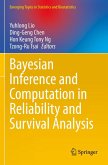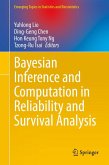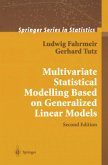Statistical Modelling for Evidence-Based Public Health
Case Studies in HIV/AIDS Epidemiology and Child and Maternal Health
Herausgegeben:Kazembe, Lawrence N.; Kaombe, Tsirizani M.
Statistical Modelling for Evidence-Based Public Health
Case Studies in HIV/AIDS Epidemiology and Child and Maternal Health
Herausgegeben:Kazembe, Lawrence N.; Kaombe, Tsirizani M.
- Gebundenes Buch
- Merkliste
- Auf die Merkliste
- Bewerten Bewerten
- Teilen
- Produkt teilen
- Produkterinnerung
- Produkterinnerung
This book presents a selection of statistical techniques and methods applied to analyze data arising from HIV/AIDS epidemiology, as well as child and maternal health. Evidence-based decision-making in public health interventions requires appropriate techniques applied to solve relevant statistical and epidemiological questions, which would, in turn, bring out relevant outputs for action. The different chapters assembled in this book, address various methodological challenges when analyzing HIV/AIDS, child and maternal health data. These include data issues for handling correlated outcomes and…mehr
Andere Kunden interessierten sich auch für
![Biostatistics Modeling and Public Health Applications Biostatistics Modeling and Public Health Applications]() Biostatistics Modeling and Public Health Applications136,99 €
Biostatistics Modeling and Public Health Applications136,99 €![Statistical Modeling and Applications Statistical Modeling and Applications]() Statistical Modeling and Applications151,99 €
Statistical Modeling and Applications151,99 €![Quantitative Epidemiology Quantitative Epidemiology]() Xinguang ChenQuantitative Epidemiology83,99 €
Xinguang ChenQuantitative Epidemiology83,99 €![Quantitative Epidemiology Quantitative Epidemiology]() Xinguang ChenQuantitative Epidemiology61,99 €
Xinguang ChenQuantitative Epidemiology61,99 €![Bayesian Inference and Computation in Reliability and Survival Analysis Bayesian Inference and Computation in Reliability and Survival Analysis]() Bayesian Inference and Computation in Reliability and Survival Analysis113,99 €
Bayesian Inference and Computation in Reliability and Survival Analysis113,99 €![Bayesian Inference and Computation in Reliability and Survival Analysis Bayesian Inference and Computation in Reliability and Survival Analysis]() Bayesian Inference and Computation in Reliability and Survival Analysis113,99 €
Bayesian Inference and Computation in Reliability and Survival Analysis113,99 €![Multivariate Statistical Modelling Based on Generalized Linear Models Multivariate Statistical Modelling Based on Generalized Linear Models]() Ludwig FahrmeirMultivariate Statistical Modelling Based on Generalized Linear Models191,99 €
Ludwig FahrmeirMultivariate Statistical Modelling Based on Generalized Linear Models191,99 €-
-
-
This book presents a selection of statistical techniques and methods applied to analyze data arising from HIV/AIDS epidemiology, as well as child and maternal health. Evidence-based decision-making in public health interventions requires appropriate techniques applied to solve relevant statistical and epidemiological questions, which would, in turn, bring out relevant outputs for action. The different chapters assembled in this book, address various methodological challenges when analyzing HIV/AIDS, child and maternal health data. These include data issues for handling correlated outcomes and repeated measurements generated through longitudinal or follow-up processes, spatial-temporal correlation, measurement error, missingness, co-morbidity, survival analysis, detection of outlying health outcomes, and joint occurrences of outcomes. Essential approaches that enhance statistical science, are presented, when dealing with variable and model selection.
Each chapter motivates the problem, provides details of the relevant bio-statistical methods used to tackle the problem, applies the methods to the data, and offers some epidemiological or public health recommendations. Readers can replicate the methods to their data, and R command codes are supplied at the end of each chapter.
Each chapter motivates the problem, provides details of the relevant bio-statistical methods used to tackle the problem, applies the methods to the data, and offers some epidemiological or public health recommendations. Readers can replicate the methods to their data, and R command codes are supplied at the end of each chapter.
Produktdetails
- Produktdetails
- Emerging Topics in Statistics and Biostatistics
- Verlag: Springer / Springer Nature Switzerland / Springer, Berlin
- Artikelnr. des Verlages: 978-3-031-97280-5
- Seitenzahl: 580
- Erscheinungstermin: 27. September 2025
- Englisch
- Abmessung: 241mm x 160mm x 37mm
- Gewicht: 1025g
- ISBN-13: 9783031972805
- ISBN-10: 3031972805
- Artikelnr.: 74304904
- Herstellerkennzeichnung
- Springer-Verlag GmbH
- Tiergartenstr. 17
- 69121 Heidelberg
- ProductSafety@springernature.com
- Emerging Topics in Statistics and Biostatistics
- Verlag: Springer / Springer Nature Switzerland / Springer, Berlin
- Artikelnr. des Verlages: 978-3-031-97280-5
- Seitenzahl: 580
- Erscheinungstermin: 27. September 2025
- Englisch
- Abmessung: 241mm x 160mm x 37mm
- Gewicht: 1025g
- ISBN-13: 9783031972805
- ISBN-10: 3031972805
- Artikelnr.: 74304904
- Herstellerkennzeichnung
- Springer-Verlag GmbH
- Tiergartenstr. 17
- 69121 Heidelberg
- ProductSafety@springernature.com
Dr. Lawrence Kazembe is a Professor of Applied Statistics and Head of Department at the University of Namibia, and has a career that spans 30 years. With a PhD from Kwazulu-Natal University and extensive experience in biostatistics and research, he has held key academic and research roles across Eastern and Southern Africa, including at South African Medical Research Council, and Malawi-Liverpool Wellcome-Trust Clinical Research Programme. His work spans epidemiology, statistical modeling, and public health, with over 130 peer-reviewed publications. He has led multiple international research projects on biostatistics, food security, and health, funded by Wellcome Trust, Open Society, and others. A recognized leader in applied statistics, he contributes to policy and academia through high-impact research and mentorship in statistical sciences. He has supervised over 50 masters and over 15 PhDs. Tsirizani Mwalimu Kaombe is a Senior Lecturer in Statistics in the Department of Mathematical Sciences within the School of Natural and Applied Sciences at the University of Malawi. He holds a Ph.D. in Biostatistics from the University of Malawi. In the past five years, he has successfully supervised/co-supervised 7 master’s degree theses on biostatistics and is currently supervising 4 more at the University of Malawi. His main area of research is regression diagnostics, particularly for non-linear multivariate data models. He is also interested in bivariate or joint probability distributions’ non-linear models. Tsirizani Kaombe has 10 refereed publications to his name, with more than 15 manuscripts in press. Dr. Kaombe serves as a journal reviewer for Archives of Public Health, BMC Research Notes, BMC Medical Research Methodology, BMJ Open, BMC Public Health, BMC Pediatrics, Communications Medicine, and BMC Infectious Diseases. He is also serving as regional president for the International Biometric Society (IBS) Malawi chapter.
Foreword.- Chapter 1 Advancing evidence-based decision-making in public health: The critical role of practical biostatistical methods for health monitoring in sub-Saharan Africa.- Part I Bivariate (or Joint) Modelling of Public Health Data.- Chapter 2 A trivariate copula model with endogenous predictor variable to estimate determinants of zero-dose and under-immunized children in Angola and Ethiopia using survey data.- Chapter 3 Determinants of female schooling and fertility in Malawi: An application of bivariate Poisson regression model.- Chapter 4 A copula approach to sample selection modeling of treatment adherence and viral load among HIV patients on antiretroviral therapy.- Chapter 5 Joint Modelling of Water, Sanitation, and Hygiene (WASH) Using a Generalized Joint Regression Model in Namibia.- Part II Hierarchical and Multilevel Modelling of Health Data.- Chapter 6 Hierarchical outlier linkages between cluster and subject levels in a multivariate logistic regression model for child mortality data from a complex survey in Malawi.- Chapter 7 Application of mixed effects models to predict viral suppression and CD4 cell counts in a cohort of ART patients in Namibia.- Chapter 8 Transition autoregressive mixed models applied to analysis of viral load and CD4 cell count data for ART patients in Nambia.- Chapter 9 Modeling viral load using mixed effects regression models and generalized estimating equations.- Part III Time-To- Event Modelling of HIV and AIDS, Child and Maternal Health Data.- Chapter 10 Semiparametric and parametric mixed-effects survival regression methods applied to the analysis of women s birth interval data in Malawi.- Chapter 11 Competing risks of defaulting and transferring out in the ART cohort of HIV and TB co-infected individuals in Namibia.- Part IV Model Fitting, Causal Inference, and Machine Learning Techniques for Public Health Data.- Chapter 12 Properties of model errors in logistic regression and their application to detect outliers in child mortality study.- Chapter 13 Methods Using Propensity Scores to Estimate Causal Effects in Observational Longitudinal Studies.- Chapter 14 Robust, quantile, and mean regression diagnostics for a comprehensive analysis of outlier haemoglobin levels in women using cross-sectional survey data in Malawi.- Chapter 15 A Machine Learning Approach to Identifying Shared Determinants of the Childhood Stunting in Kenya, Tanzania, Zambia and Malawi.- Chapter 16 Modelling progression of HIV disease using homogenous semi-Markov processes with an application to a cohort in Namibia.- Chapter 17 Modeling viral load with response missingness and covariate measurement error.- Chapter 18 Application of multivariable binary logistic regression model, nomogram and classification tree to predict baseline acute respiratory distress in severe malaria African children.- Part V Advanced Spatial and Bayesian Statistical Methods for Public Health Data Modelling.- Chapter 19 Incorporating Heavy-Tailed Spatial Random Effects in the Analysis of Areal Disease Data.- Chapter 20 Mapping HIV epidemic in Namibia using Bayesian spatial modelling.- Chapter 21 Mixed-effects logistic regression grouped outlier residuals and GeoSpatial logistic model applied to analysis of outlier communities to late treatment-seeking behaviour for childhood malaria in Malawi.- Chapter 22 Mapping gender-specific spatial disparities in HIV testing and condom use in Namibia.- Index.
Foreword.- Chapter 1 Advancing evidence-based decision-making in public health: The critical role of practical biostatistical methods for health monitoring in sub-Saharan Africa.- Part I Bivariate (or Joint) Modelling of Public Health Data.- Chapter 2 A trivariate copula model with endogenous predictor variable to estimate determinants of zero-dose and under-immunized children in Angola and Ethiopia using survey data.- Chapter 3 Determinants of female schooling and fertility in Malawi: An application of bivariate Poisson regression model.- Chapter 4 A copula approach to sample selection modeling of treatment adherence and viral load among HIV patients on antiretroviral therapy.- Chapter 5 Joint Modelling of Water, Sanitation, and Hygiene (WASH) Using a Generalized Joint Regression Model in Namibia.- Part II Hierarchical and Multilevel Modelling of Health Data.- Chapter 6 Hierarchical outlier linkages between cluster and subject levels in a multivariate logistic regression model for child mortality data from a complex survey in Malawi.- Chapter 7 Application of mixed effects models to predict viral suppression and CD4 cell counts in a cohort of ART patients in Namibia.- Chapter 8 Transition autoregressive mixed models applied to analysis of viral load and CD4 cell count data for ART patients in Nambia.- Chapter 9 Modeling viral load using mixed effects regression models and generalized estimating equations.- Part III Time-To- Event Modelling of HIV and AIDS, Child and Maternal Health Data.- Chapter 10 Semiparametric and parametric mixed-effects survival regression methods applied to the analysis of women s birth interval data in Malawi.- Chapter 11 Competing risks of defaulting and transferring out in the ART cohort of HIV and TB co-infected individuals in Namibia.- Part IV Model Fitting, Causal Inference, and Machine Learning Techniques for Public Health Data.- Chapter 12 Properties of model errors in logistic regression and their application to detect outliers in child mortality study.- Chapter 13 Methods Using Propensity Scores to Estimate Causal Effects in Observational Longitudinal Studies.- Chapter 14 Robust, quantile, and mean regression diagnostics for a comprehensive analysis of outlier haemoglobin levels in women using cross-sectional survey data in Malawi.- Chapter 15 A Machine Learning Approach to Identifying Shared Determinants of the Childhood Stunting in Kenya, Tanzania, Zambia and Malawi.- Chapter 16 Modelling progression of HIV disease using homogenous semi-Markov processes with an application to a cohort in Namibia.- Chapter 17 Modeling viral load with response missingness and covariate measurement error.- Chapter 18 Application of multivariable binary logistic regression model, nomogram and classification tree to predict baseline acute respiratory distress in severe malaria African children.- Part V Advanced Spatial and Bayesian Statistical Methods for Public Health Data Modelling.- Chapter 19 Incorporating Heavy-Tailed Spatial Random Effects in the Analysis of Areal Disease Data.- Chapter 20 Mapping HIV epidemic in Namibia using Bayesian spatial modelling.- Chapter 21 Mixed-effects logistic regression grouped outlier residuals and GeoSpatial logistic model applied to analysis of outlier communities to late treatment-seeking behaviour for childhood malaria in Malawi.- Chapter 22 Mapping gender-specific spatial disparities in HIV testing and condom use in Namibia.- Index.


